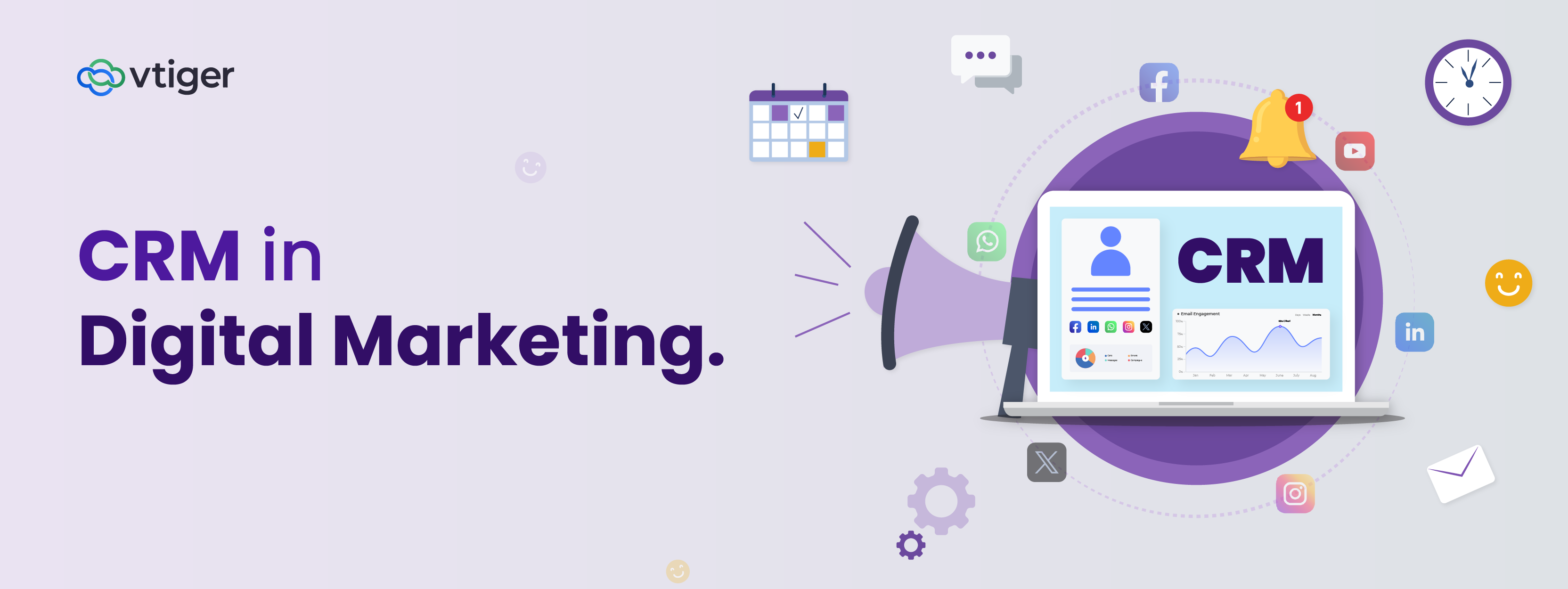Customer Relationship Management (CRM) in digital marketing is both a tool and a strategy that helps businesses manage customer interactions. In simple terms, it stores customer details, tracks their behavior online, and records how they engage with your brand.
Why is this important? Because digital marketing is not just about reaching new people, it also involves building long-term relationships with them. A CRM system helps marketers understand who their customers are, what they want, and how they respond to campaigns. This makes it easier to plan emails, social media ads, and other activities with more accuracy.
With the right CRM, companies can improve customer loyalty, increase sales, and measure success using metrics such as CTR, ROAS, and CLV.
Understanding the Basics of CRM
CRM is a systemic approach to storing and managing customer data such as contact details, purchase history, buyer preferences, and user behavior, ensuring that every team member has access to the same information. In its broadest sense, it means managing all interactions between a business and its customers. It is not limited to digital campaigns but is a broad umbrella that deals with keeping customer relationships at the center of operations.
There are 3 types of CRM: Operational CRM (handles day-to-day interactions) , Analytical CRM (interprets customer data), and Collaborative CRM (ensures smooth communication across varied departments.
The entire purpose of CRM is to create a customer journey that feels smooth, relevant, and personal. From the first time a prospect hears about a brand, to the follow-up after a purchase, CRM ensures every step is guided by data.
Role of CRM in Digital Marketing
Digital marketing is both a process and a business driver, and a CRM sits at the center of both. As a process, it streamlines data, fuels personalization, and ensures campaigns are more efficient. As a business, it helps agencies and brands deliver measurable ROI, build stronger client relationships, and scale strategies with confidence.
Centralized Customer Data
When customer information is spread across tools, marketers miss key insights. A CRM software unifies these touchpoints, giving teams a complete picture in one place. Companies can use this unified data to build precise audience segments, while businesses gain a clear understanding of customer lifetime value, purchasing patterns, and opportunities to increase sales through personalized campaigns or upsells.
Personalization of Campaigns
CRM enables marketers to segment audiences based on behavior, purchase history, and engagement patterns. A retail brand, for instance, can use CRM insights to suggest seasonal products to returning buyers or trigger automated emails for abandoned carts. This process turns generic campaigns into personalized conversations, increasing relevance and conversion rates.
Measuring Campaign Effectiveness
CRM tracks every interaction and links it back to campaign performance. Travel agencies can analyze which email sequences generated bookings, while e-commerce businesses can monitor how social campaigns influence repeat purchases. This process allows marketing teams to optimize strategies in real time and enables businesses to make data-backed decisions instead of relying on assumptions.
Benefits of Using CRM in Digital Marketing
CRM extends the life of customer data and supports team collaboration. Insights from one campaign inform the next, ensuring both marketing efforts and business decisions remain aligned, efficient, and forward-looking. Read how using CRM for digital marketing can benefit businesses.
Smarter Campaign Planning
Patterns collected across campaigns reveal which audience groups are most likely to respond. With this knowledge, marketing teams can plan outreach with higher accuracy and invest resources where the impact will be strongest.
Cross-Channel Consistency
Interactions from email, social media, and websites are gathered in one place. This prevents conflicting messages, overlapping offers, and missed touchpoints, ensuring the customer journey feels unified and intentional.
Continuous Experimentation
CRM supports quick testing of different approaches. Messaging, timing, or visuals can be adjusted in small-scale trials, with performance tracked in real time. This creates a cycle of learning where each experiment informs the next strategy.
Lead Prioritization and Resource Allocation
Scoring tools within CRM highlight which leads are more likely to convert. This helps teams focus their energy on the right prospects and minimize wasted effort on less engaged contacts.
Long-Term Engagement Management
Every interaction is stored over time, making it easier to nurture relationships with consistency. Follow-ups can be timed to match customer behavior, improving both retention rates and lifetime value.
Types of CRM Used in Digital Marketing
Marketers often assume CRM means storing leads, yet its true strength lies in specialization. Some platforms push automation, others thrive on performance analysis, while a few are designed entirely for cross-team sharing. The following are the three main types of CRM in Digital Marketing:
Operational CRM
Operational CRM handles repetitive marketing tasks such as email automation, drip campaigns, and lead nurturing. Instead of manually sending reminders or tracking every prospect, the system automatically moves leads through the sales funnel. This helps teams save time and maintain consistency in campaigns.
Collaborative CRM
Collaborative CRM makes customer information accessible to both sales and marketing teams. Features like shared dashboards, customer interaction history, and real-time reporting ensure everyone works with the same data. This reduces lead loss, improves handovers, and keeps both teams aligned on common KPIs.
Analytical CRM
Analytical CRM turns raw customer data into useful insights. Marketers use it for churn prediction, customer segmentation, attribution modeling, and lifetime value (LTV) analysis. In simple terms, it shows which campaigns bring the best ROI and where budgets should be adjusted for maximum impact.
CRM Features That Help Digital Marketing Teams
A modern CRM in digital marketing is an active system that aligns campaigns, interprets performance, and centralizes insights. The following features directly influence how teams plan, monitor, and optimize their marketing efforts.
Email Campaign Management
Modern CRMs allow teams to create and manage campaigns with defined audience segments, automated triggers, and performance tracking. Instead of generic blasts, marketers can monitor open rates, CTR, and engagement patterns to improve their approach and align campaigns with measurable ROI.
Social Media Integration
A CRM that connects directly to platforms such as LinkedIn, Instagram, or Facebook ensures campaigns are managed in a single interface. Teams can track lead source attribution, engagement metrics, and conversion trends without constantly switching between tools.
Lead Tracking
Every lead’s journey, whether it starts from a website form, ad click, or webinar; is mapped and stored. This visibility allows marketing teams to prioritize high-quality leads, calculate customer acquisition speed, and understand which campaigns generate stronger ROI.
Customer Journey Mapping
CRMs help visualize paths across digital touchpoints, from the first interaction to post-conversion engagement. This feature enables better allocation of marketing spend and fine-tuning of multi-channel attribution models.
Choosing the Right CRM for Your Business
The market is crowded with CRM options that all promise growth, automation, and better customer relationships. Yet the real challenge is not finding a CRM but selecting one that fits your exact business and marketing goals. Find a system that incredibly syncs with the team’s workflows and long-term strategy.
Business Size and Budget
The scale of your operations often dictates the type of CRM you need. Enterprise-level businesses usually lean toward a feature-heavy open source CRM that can manage high data volumes, advanced segmentation, and multi-department access. On the other hand, startups or small businesses may benefit from lightweight, cost-effective CRMs that avoid overcomplexity while still offering automation for emails, lead scoring, and reporting.
Integration Needs
A CRM rarely operates in isolation. It must sync seamlessly with email platforms, ad dashboards, social media trackers, and ERP systems. Without smooth integration, bottlenecks surface; forcing manual updates, misaligned campaigns, and lost insights. Before choosing, evaluate whether the CRM offers APIs, plug-and-play connectors, or marketplace integrations aligned with your marketing stack.
Ease of Use and Training
Even the most advanced CRM loses value if teams resist using it. Adoption rates hinge on the software’s usability. Look for platforms with clean dashboards, guided workflows, and minimal training overhead. If the CRM requires weeks of onboarding or constant troubleshooting, productivity suffers. In digital marketing, where speed matters, usability isn’t optional; it’s survival.
Data Security and Compliance
With rising scrutiny on customer data, a CRM must safeguard compliance. From GDPR in Europe to CCPA in California, businesses risk fines and customer mistrust if they ignore regulations. Evaluate whether the CRM offers role-based access, encryption, audit logs, and built-in compliance frameworks. A secure CRM doesn’t just protect you legally—it strengthens customer loyalty.
Balancing Efficiency with Scalability
A CRM should fit your business today without choking growth tomorrow. Too simple, and it becomes obsolete as your customer base expands. Too complex, and it weighs down smaller teams. The best choice is one that balances efficiency for current needs while offering modules, upgrades, or tiers that scale seamlessly as strategies evolve.
Best Practices for Using CRM in Digital Marketing
The value of a CRM becomes apparent from how consistently and intelligently it’s used. Marketers often underestimate how quickly a well-designed CRM can lose its edge if best practices aren’t maintained. Below are some practices that you should follow:
Keep Data Clean and Updated
Marketing campaigns collapse when they rely on outdated or duplicated records. A CRM is only as valuable as the data it holds, so consistent validation, deduplication, and segmentation of customer records are critical. Updated data directly impacts CTR, lead scoring accuracy, and campaign targeting, ensuring that ad spend translates into qualified engagement instead of wasted impressions.
Train Marketing Teams Regularly
CRM systems evolve rapidly with new automation modules, reporting dashboards, and AI-driven recommendations. If teams are not trained, adoption slows and opportunities get missed. Regular workshops or platform-specific training sessions help marketers use features such as predictive lead scoring and automated drip campaigns effectively, resulting in measurable ROI.
Automate but Personalize
Workflow automation saves time on repetitive tasks such as lead assignment, follow-up scheduling, or email drip campaigns. However, automation without personalization creates generic noise. CRMs allow segmentation based on buyer journey stage, demographics, and behavioral triggers, ensuring that automated campaigns still feel contextually relevant and increase conversion probability.
Use Analytics for Continuous Improvement
A CRM generates actionable insights that go beyond vanity metrics. Teams should actively study funnel drop-offs, campaign attribution reports, and customer lifetime value (CLV) trends. Using these dashboards to iterate on targeting strategies not only improves ROAS but also aligns long-term retention efforts with immediate revenue goals.
Common Mistakes to Avoid
CRM systems promise efficiency, but their impact often collapses because of overlooked errors that quietly accumulate. Research by Digital Silk highlights that nearly 45% of businesses regret not integrating CRM with marketing tools, making it the most recurring failure point. Other mistakes surface in ways that are less obvious but equally damaging:
- Overcomplicating CRM setup: Teams sometimes add layers of custom fields and multi-step workflows that end up slowing campaign launches. Instead of clarity, the system produces friction.
- Ignoring data analysis: Many businesses store vast customer interaction data but never extract insights for segmentation, attribution pathways, or CTR optimization. The result is campaigns guided by instinct rather than evidence.
- Not integrating with marketing tools: Without alignment between CRM and channels like email, ads, or automation suites, businesses miss the synergy of real-time lead scoring and conversion path mapping.
- Failing to update customer data: Stale contact lists create delivery errors, targeting mismatches, and skewed dashboards. Poor data hygiene can distort lifetime value projections and funnel performance tracking.
FAQs about CRM in Digital Marketing
What does CRM mean in digital marketing?
CRM stands for Customer Relationship Management. In digital marketing, it is a tool that organizes and analyzes customer interactions across channels. It helps track leads, purchases, and engagement while enabling marketers to segment audiences, schedule communications, and maintain consistent follow-ups based on data-driven insights.
Is CRM only for large businesses?
No. Over 70% of small and medium-sized businesses now use CRM systems. Affordable, cloud-based solutions allow SMEs to manage leads, monitor interactions, and improve customer relationships. CRM adoption has become a standard practice for businesses regardless of size.
Can CRM help with social media marketing?
Yes. CRM can capture leads, track engagement, and monitor activity on platforms like Facebook, Instagram, or LinkedIn. It allows marketers to schedule posts, analyze responses, and segment audiences for more precise campaigns.
How does CRM improve customer retention?
CRM organizes all customer information in one place, including past purchases, preferences, and interaction history. This allows businesses to send relevant updates and targeted offers at the right time. By maintaining consistent and personalized communication, customers stay connected, repeat purchases increase, and long-term loyalty is strengthened.
What’s the difference between CRM and marketing automation?
CRM focuses on managing customer data, interactions, and relationships. Marketing automation is designed to automate repetitive tasks such as emails, campaigns, or follow-ups. While they overlap, CRM provides insights, and automation executes marketing activities efficiently.
How much does a CRM cost?
Pricing depends on the platform, number of users, and features. Entry-level cloud CRM plans can be affordable for small businesses, while advanced systems for larger organizations may include more integrations and higher fees.
Can CRM integrate with my email marketing tool?
Most modern CRM systems integrate with popular email platforms. Integration allows automatic syncing of contacts, segmentation based on behavior, and tracking of email performance within the CRM for better campaign management.
Is CRM software hard to use?
Not necessarily. Many CRM tools are designed with user-friendly interfaces and step-by-step guides. Training resources, tutorials, and customer support help teams adopt the software efficiently.
Does CRM work for B2B and B2C marketing?
Yes. CRM helps both B2B and B2C businesses by managing leads, tracking interactions, and supporting personalized communication. The system can be tailored to different sales cycles and customer behaviors.



